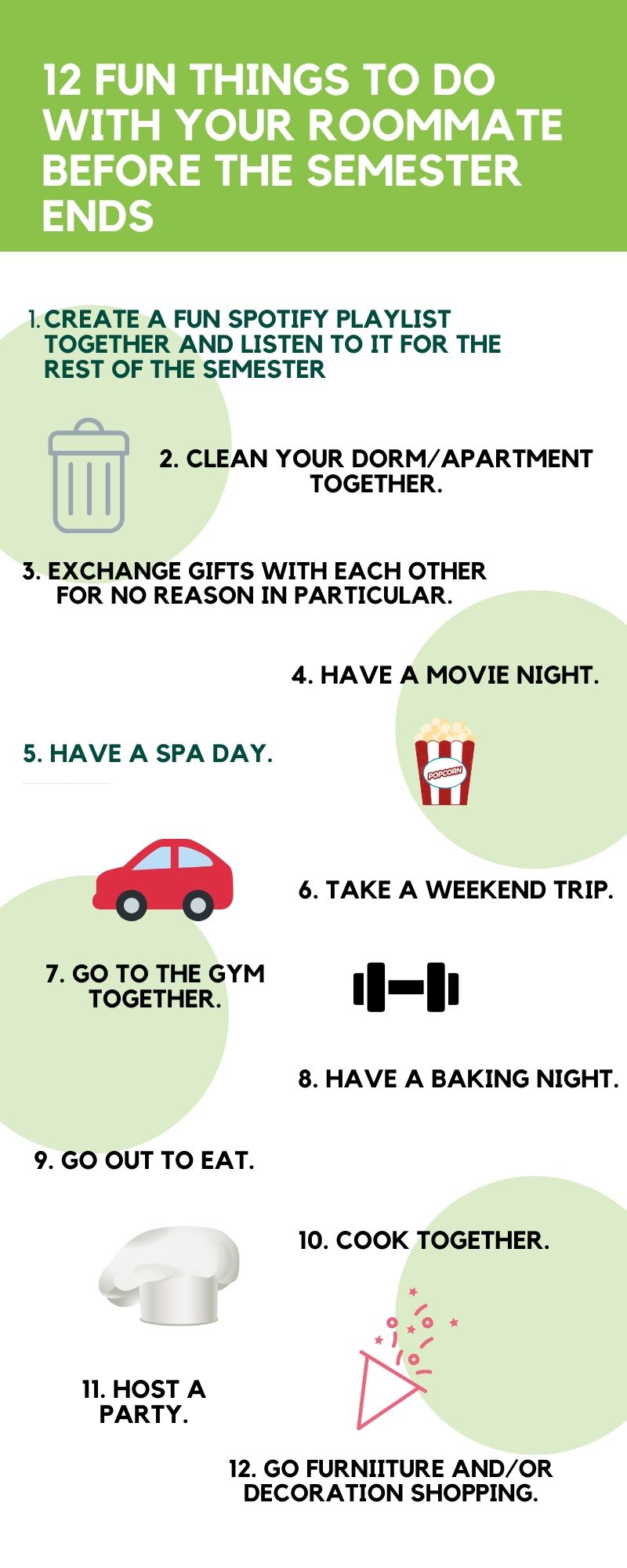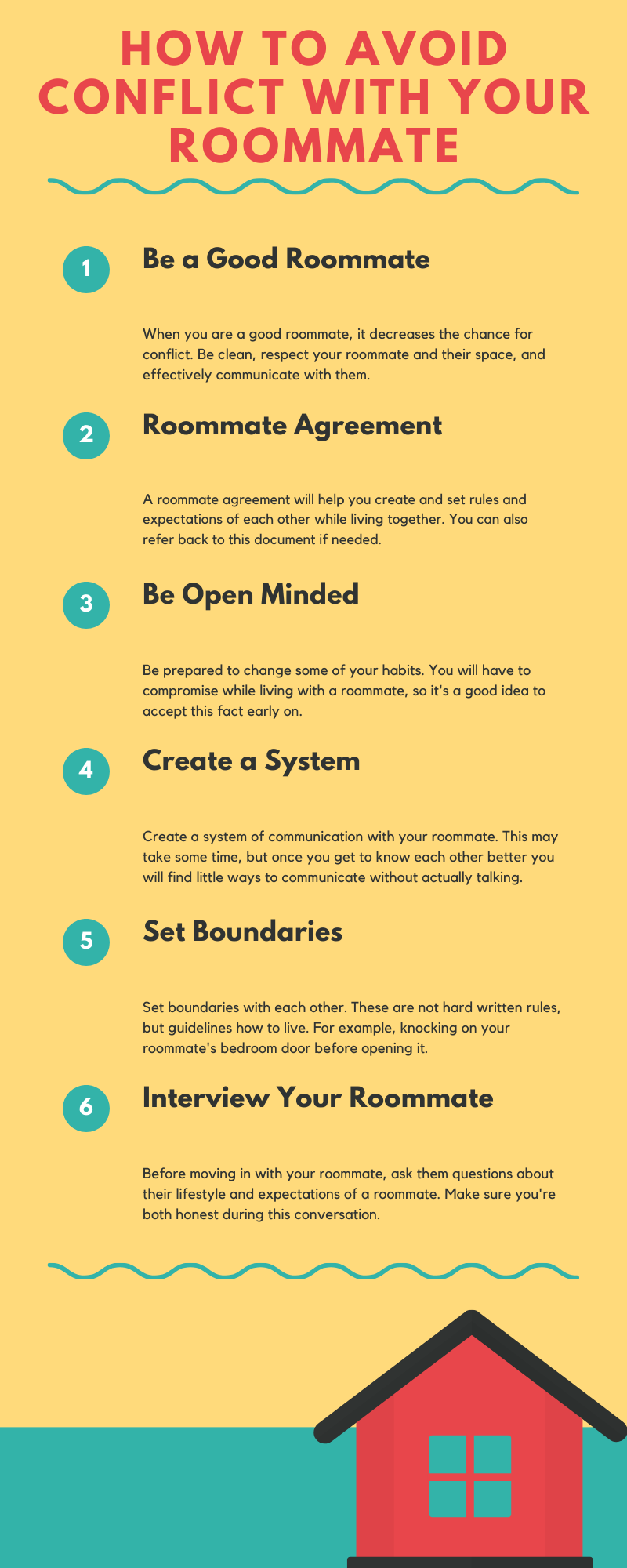College Roommate Tips
12 Fun Things to Do With Your Roommate Before the End of the Semester
It may seem as if the semester just started, but -- believe it or not -- you’re at least halfway through the semester at this point, and the end is fast approaching.
There are probably a lot of things that you’ve realized you need to do to finish off the semester successfully: catch up on all your homework assignments, study for upcoming exams (including finals!), or go to the gym more often, just to name a few. But another thing you might not have thought of is spending more time with your roommate. You’ve most likely been living with this person for almost a whole academic year (or longer possibly) -- and if you enjoy their company, it’s time to start brainstorming and putting into action the fun things you can do with them before the semester ends.

pexels.com
1. Create a fun Spotify playlist together and listen to it for the rest of the semester (and even after the semester is over).
If you and your roommate have similar tastes in music -- and even if you don’t -- creating a Spotify playlist together is a great way to have fun and laugh a lot. During my junior year, my roommate and I made a “throwback” Spotify playlist full of songs from the early 2000s up to 2014. It led to several hours of laughter and good memories, and I still listen to that playlist to this day.
It can be loads of fun to come up with songs and throw all your suggestions together into one giant playlist -- the product of your hard work! Plus, if you and your roommate like different kinds of music, this can still be a valuable experience. Maybe you can each learn something new about each other and try listening to different music for once.
2. Clean your dorm/apartment together.
Alright, this might not sound like the most fun activity to participate in, but it can honestly turn out to be a lot more fun than you think (especially if both you and your roommate love to clean). Identify what areas need to be cleaned or organized -- bathroom, kitchen, bedrooms, common area space, etc. -- whether they need a deep cleaning or just a light fixing up, and who will clean what. Then blast some music (aka the Spotify playlist you just created) and get to work. It’s a great way to have some fun with your roommate while also being productive, and you can do it as often or as little as you like -- once a week, once a month, just once for the remainder of the semester … the choice is yours.
3. Exchange gifts with each other for no reason in particular.
At this point in the semester, the major gift-giving holidays have come and gone, but that doesn’t mean you can’t still exchange gifts with your roommate. Come up with your own special occasion, or just give each other gifts to show how much you appreciate one another. Of course, these gifts don’t have to be super fancy or expensive -- you’re living on a college student budget, after all.
The good news is that there are plenty of affordable, creative gift options that you can turn to. One cute idea is a coupon book, which you can fill with little “coupons” that your roommate can trade in to get something from you -- perhaps “one dinner date” with you or “one week of taking out the garbage” when you promise to take out the garbage for your roommate. They’re small gestures, but your roommate is sure to appreciate them. You can also pick out a small personal gift that you think they would enjoy, something simple like a trinket you saw in Target or some of their favorite snacks. Giving a little gift to your roommate shows that you were thinking about them and appreciate them!
4. Have a movie night.
This is a really simple, low-cost, super fun thing to do with your roommate. The two of you might already have regular movie nights, which is awesome, but if you don’t, now might be a good time to start! Clear some time on your calendars, perhaps on Friday or Saturday nights, and pick a movie you both want to see. Make some popcorn and settle in for a night of entertainment. It’s sure to be a good time.
5. Have a spa day.
After a long day or week of classes, sometimes all you want to do is go back to your room and decompress. And maybe a spa day won’t solve all your problems, but it at least will give you the chance to relax and unwind with your roommate. You can choose to go out for a professional spa day (think massages, mani-pedis, facials, the works) or opt for a cozy, personal spa day at home. If you go with the latter, choose a time that works for both of you and break out all the spa essentials -- face masks, lotion, body scrub, towels, facial products, you name it. You’ll get the chance to pamper yourself physically and spend some time unwinding with your roomie.
6. Take a weekend trip.
If you want to make some awesome, unforgettable memories with your roommate before the semester ends, you should consider taking a weekend getaway trip. At first glance, this might seem like a difficult thing to pull off, what with school- and work-related responsibilities as well as the extra expense of taking the trip. However, a weekend trip is totally feasible if you plan it out right. If either you or your roommate has a car, that makes getting around much easier because you won’t have to rely on public transportation.
You’ll also need to do your research on where you want to go and what you want to do. Since it’s just a weekend trip, plan to travel somewhere close by, ideally a nearby town or city within a few hours drive from your college campus or wherever you’re living. Scout out some attractions you can visit or upcoming events that you might be interested in attending. You can also spend some time in nature and/or getting to know the town you’re visiting -- go for a hike or a leisurely stroll and acquaint yourself with the surroundings. Try out some new restaurants and local coffee shops or bakeries. While it’s only for a weekend, it’s the perfect amount of time to give yourself a little breathing room from school and other responsibilities. Take advantage of the time to relax and have some fun with your roommate.

pexels.com
7. Go to the gym together.
This might be fun for some people more than others, but no need to worry -- there might be something at the gym that anyone can enjoy, whether they’re already a gym rat or it’s their first time stepping foot inside the gym. If you and your roommate both love the gym, great! You’ll feel right at home and you’ll each have a buddy to work out with. If the two of you (or maybe just one of you) isn’t such an experienced gym-goer, there are still some fun things worth trying out. Perhaps you could sign up for a group fitness class together; your university is sure to offer some free classes that interest you and that you can easily sign up for, from Brazilian jiu jitsu to boxing to yoga.
8. Have a baking night.
To reward yourselves for getting in a good workout at the gym, you and your roommate can whip up some baked goods. I know I always appreciated making brownies and cookies (and experimenting with other desserts) with my roommate. Baking is simple, fun, and easy, and you end up with a batch of sweet treats that you two can choose to keep all to yourselves or share with other friends.
9. Go out to eat.
Maybe you and your roommate already make a habit out of this, but if you don’t, it might be time to go out for a meal and spend some time over food together. After all, sharing a meal is a great way to get in some bonding time. If the two of you don’t go out to eat very often, there are most likely a variety of restaurants, cafes, brunch spots, etc. nearby that you can pick from. And if you already do go out to eat together regularly, maybe it’s time to diversify your meal options by picking a restaurant you’ve never been to with cuisine that you’ve never tried. Or you could even go fancier and splurge a little bit, if you’re willing to get out of your comfort zone that way. When it comes to food, there are so many possibilities for you and your roommate to try out, so take advantage of the options out there!
10. Cook together.
On the flip side, if the two of you go out to eat perhaps a bit too often and want to save money, staying in and cooking together is a great alternative. Especially if cooking is not something you two do together all that often, it can be a fun way for both of you to try something new. Figure out what kind of food you want to cook and eat (of course, something that both of you will presumably enjoy) and find a recipe for it; there are tons and tons of recipes that you can easily locate online. You may then need to take a trip to the grocery store, which is part of the fun. Once you have everything you need, you can start cooking. Whether or not the food turns out great is not the point -- the point is to have a lot of fun in the process of trying something new with your roommate. If the food happens to be amazing, well, that’s just bonus points for you two.
11. Host a party (or some kind of get-together).
After you and your roommate have (or have not) mastered the art of home cooking, you might want to put your skills to the test by hosting a small party or gathering at your place. That could potentially sound a bit daunting, but if either of you enjoys being the host or inviting lots of people over, that could very well be a great idea. Of course, you don’t want your get-together to become rowdy or out of hand; simply invite a few close friends over, break out some snacks (cheese and crackers, anyone?), and settle in for a calm night with friends. If both you and your roommate host together, that will also help to keep the party under control and give you both a sense of working together to pull something off. To make this thing successful, you’ll probably want to plan out when and where it’s going to take place, who you’re inviting, what kind of food and drinks you’ll be serving, and how much time you may need to spend cleaning things up in your apartment or dorm room.

pexels.com
12. Go furniture and/or decoration shopping together.
You two live in the same place -- why not furnish and decorate the space together, too? Understandably, you two may have very different styles of decorating, and that’s perfectly fine. However, it is important that you and your roommate respect each other’s styles, which is why it might be a good idea to pick something out together -- whether it be a chair, a table, a lamp, a painting, or what have you. On the other hand, if the two of you share similar decorating tastes, the process of furniture and decoration shopping together becomes much more appealing. In that case, the two of you can shop for as much furniture and decorations as you want. This is an awesome way to spend some time together and create a living space that both of you can enjoy and be proud of.
There are really so many things you can do with your roommate before the semester ends, so don’t hesitate. Take advantage of these next few months to soak up all the time you can with your precious roomie; you won’t regret it.

How You and Your Roomie Can Stay Healthy Living in Close Quarters
As we are in the middle of a pandemic, many states have issues Stay at Home orders. Schools have decided to transition to remote classes, nonessential businesses have shut down across the country -- many of us are confined to the walls of our homes in order to keep ourselves and each other safe. Many college students have left campus and their student housing due to campuses being mostly closed and classes moving to be conducted remotely, however, many students are also opting to stay in their apartments and living with their roommates. You may be worried about how you can stay healthy and safe living in close quarters, but with several tips in mind, you can do plenty to protect you and your roommate.
Keep reading to see what you can do.

Stop sharing drinks/food
For those of you that are close with your roommate, you may be used to splitting drinks and food -- opting to drink out of the same cup and straw or using the same fork to munch on a meal. This is definitely something you should stop doing immediately. While you and your roommate may not be displaying any symptoms of sickness, you don't want to put each other at risk by directly contaminating one another just to save yourself the few minutes of washing an extra cup.
Minimize the dangers of leaving the house
If one roommate is still having to leave the apartment to go to work or go grocery shopping, they are at risk of exposing themselves and by association, exposing you. To keep every one of you in your apartment safe, you want to make an effort to "decontaminate" upon entry.
● Keep a container of Lysol/disinfectant wipes by the door, wipe down your door handle
● Take off your shoes, leave them outside if possible
● Make an effort not to sit down, change out of your clothes and set them aside to wash
● Try to shower as soon as you can
● Disinfect items you may have brought inside, like your grocery store items, before putting them in their designated spaces
When leaving the house, make sure that you are making a conscious effort to eliminate any risks. Carry hand sanitizer. Avoid touching your face with unwashed hands. Wipe down high-touch areas such as your steering wheel, door handles, and so on.
The Centers for Disease Control and Prevention (CDC) have officially recommended that anyone who leaves their house should wear face masks to try to stop the spread of COVID-19. They recommend nonmedical cloth face masks but emphasize that these do not completely eliminate the risk of COVID-19.
Disinfectant High-Touch Point Areas As Often As Possible
It's important to remember the difference between cleaning and disinfecting. When you're cleaning, like wiping down a countertop with hot water, you are just removing dirt. Disinfecting -- using chemicals to kill germs on surfaces -- effectively will kill germs on a surface and lower the risk of spreading infection.
While door handles/knobs and countertops may be the areas you automatically think of when it comes to disinfecting, there are other high-touch items that are all too easy to forget in your disinfecting routine.
- Phone. Whether you admit it or not, you're likely spending plenty of time on your phone right now. Take a Clorox wipe, or a wipe with 70% alcohol, and wipe down your phone, with the case and without it. Before using a wipe, be sure to wring out extra moisture.
- Keyboard & Mouse. Whether you are working remotely or doing schoolwork, this is an area you'll want to clean. Use a microfiber cloth slightly dampened with water and avoid getting any keyboard openings wet. Use a can of compressed air to get the gunk out of open areas.
- Steering wheel, handles gear shift and seatbelts. Disinfectant wipes will do the trick -- avoid using bleach and hydrogen peroxide.
- Keys, remote controls, credit cards, wallets. When in doubt, just think of things you often come into contact with, especially things you touch with dirty hands.
Don't Invite People Over
While this may go without saying, don't invite people over at your apartment. Social distancing and Stay at Home orders does not mean this is the perfect time to invite people over for the rager you always wanted to throw. Birthday celebrations and in-person gatherings can wait until it is safe for everyone to do so.
Missing human contact outside of your roommates? Host a gathering over Zoom or Google Hangouts -- get creative and do game nights, watch movies or just simply talk to each other as you would.
This is definitely a scary and unpredictable time for many. In a time where it feels like there's nothing you can control, it's important to see what you can do. Together with your roommate, take action to protect yourselves.
Are You Ready to Leave Roommate Living Behind?
When most people think about college living, they think about sharing a dorm room or housing with lots of other college students. For some, this works. Living with roommates has lots of benefits like reducing costs and creating a social environment. On the other hand, roommate living isn’t the right solution for everyone. At some point, especially as you get more serious about your degree, you may start to wonder if roommate living is still the right option for you. Coming up in this article are 5 statements that you might relate to which will help you decide if it’s time to leave roommate living for good.

1. You like having your own space
Are you constantly organizing and decorating your room? Do you find that you often hang out in your room rather than in shared spaces? Treasuring your own space is a good sign that you might enjoy living alone. Lots of people have issues when sharing spaces whether it is differences in cleanliness or noise levels. Because of these issues, or other things, some people just find it easier to be in a space that is solely theirs rather than having to be out with others all the time. If you often find yourself seeking out your own room regularly, then you will likely benefit from living by yourself.
2. You enjoy quiet time
Living alone often means that your life will be a lot quieter than it would be with roommates. If you are used to people always being around and talking, watching TV, listening to music, cooking and other things, then you might find living on your own to be kind of a shock. Some people become really uncomfortable when dealing with silence. Some people really love silence and find it very important for thinking, relaxing, and working on schoolwork.
If you are someone who likes the noise and bustle of living, then you might not actually enjoy living alone. You may begin to feel uncomfortable and bored with all the empty time and space you have. Alternatively, if you find yourself savoring quiet time, then you may really love living alone.
3. You feel safe on your own
Safety is something that should be of the utmost importance. While you may not think of it all the time, feeling safe or unsafe can take a huge toll on your life. Living with roommates offers an extra sense of security because you know that someone is close by. Having roommates can also be beneficial when going to and from an apartment or house. Alternatively, it is much easier to feel unsafe when living alone. Sleeping alone can also be anxiety-inducing and could affect your sleep if you are up all night wondering if something bad will happen.
This can be especially important if you are female. Unfortunately, it is often more difficult to live alone as a woman. Especially when leaving and arriving at night, things could become a little more precarious than during the day. If you feel comfortable in defending yourself or that your neighborhood is sufficiently safe, then you will probably be just fine living alone.
4. You are responsible with money
Living alone also means that you are responsible for paying the rent and utilities all on your own. You should first make sure that you have enough income or savings to pay the required rent each month. You don’t want to end up in a situation where you cannot pay rent. You should also be punctual and feel comfortable paying bills on time each month. You will have to coordinate things like rent, electricity, gas, and internet. All of these can take time and effort to set up.
5. You’ve had roommate issues in the past
One of the main reasons people consider living without roommates is because they’ve had issues with roommates in the past.
Sometimes it can be very difficult to find the right people to live with. You may have had issues with living with friends than turned sour. You may have had trouble with people paying on time or cleaning in a way that suited everyone’s needs. Because of all these issues, you may be done with trying to find a good roommate and decide to live on your own. Not having roommates also cuts down on potential roommate conflicts! Lots of people love living alone for this very reason.
The decision to live with or without roommates is a very important one. Your living situation can really affect your mental health and your success in school as well as your social life. Before making this decision, be sure to think carefully and honestly about your own situation. You should feel confident that living alone will help you feel comfortable and happy.
How to Solve and Avoid Conflict with Your Roommate
One of the best experiences while in college is living with a roommate. You always have someone at home to support you, talk to, and figure out how to live on your own with. You’ll come out having plenty of fun and crazy stories and cherished memories.
However, living with a roommate also means having some conflicts. Living with anyone is difficult and it’s inevitable that conflicts will arise eventually. Even if you are best friends, you should be prepared to solve and avoid conflicts with each other. There are plenty of ways to handle conflict so that it does not ruin your relationship with your roommate and keep the peace in your home.

Solving Roommate Conflicts
Conflicts will eventually appear while living with a roommate. Nobody is perfect and there will be some things that really annoy you or that you take an issue with. However, when an issue arises, it is best to confront it and solve it in the beginning rather than ignoring it in hopes that it will go away. In most cases, you’ll just get more annoyed by it.
Take some steps to solve these conflicts with your roommate calmly and politely so that it doesn’t ruin your friendship or create tension in the house.
Communication is Key
Communicating with your roommate is the most important thing when it comes to solving a conflict. However, it is how you go about communicating with them that makes all the difference. Communicating with them in person is much better received than if you were to send them a text about the issue.
It’s also important to always welcome conversation with your roommate. Do not make them feel afraid to come to you with a problem that they have. Remember to not get defensive at first and listen to what they have to say before telling your side of things.
Don’t Be Passive-Aggressive
Being passive-aggressive doesn’t get anybody anywhere when it comes to roommate conflicts. In fact, it usually just makes people even angrier at the situation. So, before you decide to leave that sticky note on the bathroom mirror about closing the shower curtain after using it, think twice. Will that just make them want to leave it open for mold to grow just to get back at you?
If you have something you want to say to your roommate, say it in person. Confront them rather than leaving notes around the house.
Use Kind Language
Once you decide it’s time to confront your roommate and have a conversation about an issue, it’s important to stay calm. Be strategic about how you confront them. If you use aggressive and accusatory language such as, “You do this” and “You should not” then they will become defense and stop listening to what you have to say.
Instead, use phrases such as, “I feel” and “It makes me feel like” so that your roommate is aware of how what they do affects you. They are much more open about changing when it comes to conversations like this.
Be Ready to Compromise
You most likely will not get your way when it comes to solving an issue with a roommate. So, to avoid getting upset, always be prepared to compromise. Keep an open mind about how to solve the issue. It may not always be exactly how you want it to be solved, but if some progress is made where both of you can be a little happier, then that is a successful solution!
Listen to Your Roommate
While communication is key, so is listening. They go hand in hand. When your roommate confronts you or responds to your confrontation, listen attentively to them. They may provide important insight into how they are feeling that you were never aware of.
Maintain eye contact and lean forward when your roommate is talking to you. This shows them that you are actively listening and hearing what they have to say. They will be more likely to talk the issue out with you when they see that you are actively making an effort to listen to them.
Be Assertive
You may run into some roommates who do not take your feelings seriously. This can be very discouraging, especially when you have an issue that you would like to talk to your roommate about. This is when you need to be assertive with your roommate. Stress to them how much something bothers you and that you would really like to talk about it.
Do not let your roommate talk circles around the issue or try to manipulate you into thinking the issue isn’t important. Stand your ground and stay focused on the problem you are addressing.
Pick Your Battles
There are some cases where confronting your roommate about something isn’t worth the time and energy or the tension that it may cause in the relationship. If you confront them about every little thing that bothers you, you will build a reputation as being someone who complains a lot and can be hard to live with.
Living with someone means accepting that they will do things that you don’t particularly like. However, if it isn’t harming you, them, or damaging the house, then it may be best to just ignore it altogether.

Avoiding Roommate Conflicts
Now that you know how to solve conflicts that arise between you and your roommate, it’s time to learn how to avoid conflict altogether. If you do not have to solve a conflict in the first place, then there will be less tension in the house and much more peace. It may take a while to learn how to avoid having conflicts with your roommates at first, but over time once you get to know each other better, you will know the triggers to setting off a conflict and how they live their lives.
Know the Triggers
After living with your roommate for a while you will know what they get upset about. It may be leaving your towel on the floor in the bathroom or having friends over late at night during the week. You’ll mostly know what triggers conflict because your roommate will have confronted you about it in the past.
If your roommate has brought up an issue to you before, be respectful and do not do it again. It will only cause more trouble and your roommate will be angrier this time around because they already talked to you about the issue before.
Be a Good Roommate
Part of avoiding conflict with your roommate is being a good roommate yourself. Unfortunately, while living with a roommate you cannot do whatever you want. You have to respect the other person you live with. There are a number of ways to be a good roommate.
Be Neat and Clean – Nobody likes living in a messy house. Do your dishes, pick up after yourself, and don’t let food rot in the fridge.
Respect Space – Living with a roommate means always having someone around to talk to or hang out with. However, it’s important to give each other space when needed.
Don’t Borrow Things – While your roommate may be very open with sharing their belongings, don’t ever borrow something without asking them first. This is a recipe for conflict.
Be Kind – You should always be kind to your roommate and treat them with respect. Don’t yell at them or ruin their property because you’re angry. Everyone deserves respect.
Write a Roommate Agreement
After living together for a couple of weeks with your new roommate, you should sit down and write a roommate agreement together. A roommate agreement is a document that states the official rules of the house that are agreed upon by all of the roommates. These rules can include quiet hours, guest policies, cleaning expectations, and so on.
Talk about your expectations and ideal household arrangement. It’s important to be honest and communicate effectively while writing a roommate agreement. Listen to what your roommate has to say and be prepared to compromise on things. This shouldn’t be an intense negotiation, but a friendly conversation about the expectations of your living arrangement and atmosphere.
Set Up Boundaries
There is a difference between having written rules in your roommate agreement and setting up boundaries with each other. A boundary isn’t a hard written rule, but should still be respected as one. A boundary could be something as simple as knocking on your roommate’s bedroom door before opening it.
These boundaries will help to create the ideal environment in which both you and your roommate desire to live in. However, when creating boundaries, it’s important to be honest and communicate clearly about what you want and expect from your roommate so that there is no miscommunication or confusion.
Prepare to Change
We all have an idea of how we would like to live. We have set our living habits from a very early age. However, when you live with a roommate, you may have to break some habits while adopting new ones. Keep an open mind when moving in with a roommate. When you already have the expectation that you will have to compromise and change, it will save you the disappointment once you realize you will have to.
When you are willing to change and compromise from the very beginning, this will help you to avoid some conflicts.
Create a Roommate System
You and your roommate are going to get to know each other better than anyone else you hang out with. When you live with someone, you see the good, the bad, and the morning ugly. You’ll learn how to communicate effectively, when to leave each other alone, and how to cheer each other up on a bad day.
To have a smooth-running household, it’s a good idea to create a system with your roommate. These little signs or signals will help you let your roommate know something without having to say it outright. Think about the cliché of the sock on the door. It will take a while to create and implement a system like this, especially because it is based off of your habits and personalities, but once it is in place, your household will be close to conflict free.
Respect Your Roommate
The number one thing to avoid having conflicts with your roommate is to respect them. Respect their space. Respect their belongings. Respect their wishes. This doesn’t mean that you have to always give in to what your roommate wants, especially if you disagree with it. This means being polite and treating them well.
This is one of the most important aspects of being a good roommate. When you show respect to your roommate, they will show you respect as well.
Vet Your Roommate
Before moving in with someone, it’s important to have a serious and honest conversation to see if you will be a good match together. Talk about your interests, your sleeping habits, cooking habits, if you are messy or neat. These are all important factors to consider when thinking about living with someone.
You’ll want to see if your personalities and lifestyles mesh well together. There are some people who are great close friends, but their living styles are so different that they end up ruining their friendship because of it. So, be honest in what you want and expect in a roommate and don’t be afraid to have this conversation with multiple people until you find the right one.
Peacefully Living with Roommates
To live with roommates peacefully takes a lot of work. You’ll have to compromise on a lot of situations, confront them, and learn how to communicate effectively. However, once you have solved some conflicts in the past, it will be much easier to avoid them in the future. The more you get to know your roommate, the better you will be able to communicate with them, solve conflicts, and avoid them altogether.

5 Reasons Why You Shouldn't Live With Your Best Friend
When it comes to choosing a roommate, whether you live on or off-campus, the first person you probably think of is your best friend. After all, how cool would that be? You start imagining all the great things you could do together -- watch movies, stay up late talking every night, borrow each other’s clothes… the list goes on and on. At the same time, however, you’ve probably also heard it said before: you shouldn’t live with your best friend. That may seem like a weird piece of advice, but let’s be honest, there are also some good reasons as to why you should avoid living with your best pal and instead room with someone else.

pexels.com
1. It won’t feel like a sleepover every night.
Sleepovers with your best friend are a lot of fun. You can’t help but look forward to spending time with them because, first of all, they’re your best friend, and second of all, sleepovers are a special occasion that only happen once in a while. When you live with your best friend every single day, though, that special feeling might start to go away after a while. Being in such close proximity with your best friend all the time could even lead to a host of other problems, which brings us to the next point …
2. You might get into arguments.
Let’s face it -- you’ve probably had at least a few arguments with your best friend at some point. If you haven’t yet, rooming with them might be an unfortunate breaking point for the two of you. This isn’t to say that your friendship will be forever ruined, but it is important to be aware of the potential disagreements you two could have -- which could involve anything and everything. You may know each other very well and spend a lot of time with one another, but when it comes to sharing a place together and being in the same space all the time, that’s a different story. You also can’t predict what kinds of conflicts may arise between the two of you, so it’s important that you both think about the pros and cons of living with each other if you want to avoid getting into arguments.
3. You won’t be able to vent to your best friend about your roommate.
One of the wonderful things about not living with your best friend is that you can share horror stories about your roommate with them at any time. All the things that your roommate might be doing to annoy or upset you -- from leaving dirty dishes in the sink to not cleaning their hair out of the shower drain to bringing friends over at midnight -- you would normally be able to vent to your best friend about. But if your best friend happens to be your roommate already, that makes it a little difficult to vent to them. Sure, you may have other close friends you can share your woes with, but it probably won’t be the same as sharing your feelings with your best friend. As a result, you might want to think twice before sealing the deal to live with your best friend.
4. It may be difficult to respect each other’s space.
When you live with another person, especially someone you’re very comfortable with, there is bound to be some spillover into each other’s space -- whether that be on each other’s sides of the room, the bathroom, the kitchen, or what have you. This may be fine for the short term, but after living with your best friend for a year, keeping the peace may become a bit more difficult. Maybe you won’t want your best friend constantly borrowing your clothes or your makeup without asking you, or inviting friends to crash at your apartment every other night, or anything else along those lines. In addition, you and your best friend might have different styles of decorating -- which is fine, of course, but it’s something else to consider when you have to share a place with them. Whatever the case, be prepared to handle being too close for comfort.
5. You may need to spend time apart from each other.
After spending so much time in close quarters, you and your best friend simply may need to take a break from each other. This is not necessarily a bad thing -- after all, everyone needs their space sometimes -- but if you more and more frequently decide you need a breather from being around your best friend, that might be a red flag. As a result, you should figure out how to best handle situations with your best friend when things get too heated.
At the end of the day, whether or not you want to live with your best friend is up to the two of you. Just make sure you carefully think through the pros and cons, and you should be able to maintain a strong, healthy relationship with your best friend -- and with whoever you choose to be your roommate, too.
How to Split Bills with Your Roommate
Many of us college students live with roommates. Living with roommates is great because it’s less expensive, but it means you will need to deal with splitting bills. In this article, we’ll discuss how to split bills with your roommate.

Image via Isorepublic.com
Discuss splitting bills at the very beginning
Toward the beginning of your time together with your roommate, have a discussion about how the bills will be split. It’s awkward, but it’s a critical conversation to have. It makes more sense for some bills to be split down the middle (like utilities), but it could make more sense for other bills to be dealt with a different way (like a Netflix subscription). When you and your roommate come to an agreement, be sure to keep it in writing, detailing exactly who owes how much for each bill, and when it’s due. This will save you from a lot of confusion. Don’t put off having this important conversation!
Discuss moving costs
During the same conversation, you and your roommate could discuss moving costs. It’s no secret that moving comes with many startup expenses. For example, new appliances, electronics, furniture, paper goods, installation fees, and moving fees/security deposits. It’s a good idea to come to an agreement on who will pay for what. I would recommend for only one person to pay for tangible items like appliances, electronics, and furniture, because when it comes time to move out, only one person can take a tangible item. Again, write down which item belongs to whom, to avoid any confusion when move out day arrives. It’s important for you and your roommate to agree on how to split moving costs.
Assign responsibilities
Once you and your roommate live together, you should assign responsibilities to maintain a system where everyone is paying their fair share of the bills. If you don’t have a good system, you could accidentally miss a payment! A good “system” looks like one person being responsible for dealing with the paper copies of bills, while the other person is responsible for actually sending in the payment and making sure it went through. If you create a system like this, it will prevent you from missing any payments and from making sure you pay the correct amount every month.
Decide what bills you will split down the middle
In some cases, it makes sense to split bills down the middle. Here are examples of such bills:
- Internet/WiFi and cable
- Electricity
- Water
- Gas/li>
- Rent (in some cases. We’ll discuss the other cases in the next point!)
To split these kinds of bills with your roommates, simply split them down the middle, being sure each person pays their share.
Decide what to do with the rest
For other bills, it does not make sense to split them down the middle. For example, if one roommate has a much bigger room with her own bathroom and a walk-in closet, while another has to share a bathroom or has a smaller closet, it makes sense to make the roommate with the bigger room, bathroom, or closet pay more in rent since the larger space is worth more money. Another example of bills you might want to split differently is entertainment subscriptions. For this, I would recommend one roommate pay for one subscription, and another one pay for another. One person can pay for Netflix, while the other one pays for Amazon Video. Of course, these are only suggestions, but I think these are good ways to split these kinds of bills.
Decide how you will manage groceries
Managing groceries with a roommate can be tricky. Some people like to split groceries with their roommates, but I don’t think it’s a good idea. It works for some people, but I have heard of others coming home to find their roommate ate all the food they both paid for. Instead, I would recommend keeping groceries separate, and not eating each other’s food without permission. This way, you can buy the food you want, not the food your roommate wants. You also won’t need to coordinate trips to the grocery store. Because there are many potential ways to do it, you and your roommate should discuss how you will manage groceries.
Take advantage of apps
Nowadays, we have many good apps to help us split bills. These apps are useful not only for splitting household bills with your roommate but also for restaurant bills or ridesharing with friends, so they are worth downloading even if you don’t have a roommate. A couple of good apps you can use are Venmo, Paypal, and Splitwise. Find one that works for you and your roommate and use it! (Plus, sending a request on one of these apps the perfect way to quietly remind your roommate their share of the bills are due!)
What to Consider When Looking for a Roommate
As a college student, it is likely inevitable that you’ll have a roommate at some point. You know that roommates are good for socializing and keeping costs down while going to school. Unfortunately, the process of looking for a roommate can be a bit daunting if you’ve never done it before. How do you find one? How do you know if they’re compatible? Keep reading for more tips and information on how to go about finding a great roommate.

Searching for a Roommate
The first hurdle to overcome when searching for a roommate is how to find one. Navigating this can be really tricky because choosing a roommate is extremely personal, after all, you will be living with this person. When searching for a roommate, work in stages. The first stages should lead to you trustworthy people through friends and family, but if you aren’t finding anything this way, you may have to go towards more public avenues.
The easiest way to find a roommate is through word of mouth. Try asking friends and family in the area if they know of anyone looking for a roommate. Asking around can help make connections with people that you know or partially know. This is likely the safest option and will make finding a good roommate more likely. You may want to also post on your Facebook page that you’re looking for a roommate. This may help spread the word to family and friends that you may not be in close contact with. It allows you to expand your search without having to do too much.
If searching through friends and family doesn’t work, you may have to go a bit more public. As a college student, you’ll probably be looking for someone that is also a student. Most colleges have resources that students can use to help them figure out housing situations. If they have a housing department, you may want to get in contact and see if they know of anyone looking for a roommate. They may be able to point you in the right direction. Additionally, if your university has forums or groups that you can post on, this may also be a good way to find other students looking for roommates. If a digital posting doesn’t yield any results, I’ve also seen students put up posters around campus that say they’re looking for a roommate. This is a sure-fire way for lots of people to see what you’re looking for.
If you still aren’t having any luck with these methods, it may be time to turn to more public avenues. This might include posting on more public social media pages or listing on websites like Craigslist. However, when doing things like this, make sure that you are limiting the amount of information you present to the public. Additionally, make sure that you specify what kind of person you are looking for. If you are looking for a female roommate, make sure you say so. If you are looking for someone without pets, say this as well. Be specific so that you limit the number of responses you get from people that aren’t at all what you’re looking for. Of course, you’ll still receive some that you’ll have to screen out. When meeting with potential roommates, make sure you do so in a public place and have a list of questions ready.
Key Questions to Ask:
Here are a few sample questions to ask a prospective roommate.
1. What is a typical day for you?
This question should hopefully answer some other, smaller questions as well. By asking what a typical day looks like, you should be able to deduce what this person does (either as a job or as a student), what hobbies they may have, how social they are, and how late they like to stay up. Usually, you will be able to tell right away whether this person lives a similar or completely different lifestyle to you. If they say that they do things that you know would bother you, like partying or playing loud music, then this should be a red flag.
2. How often do you think an apartment should be cleaned?
This is another question that tells more than just what is on the surface. It helps you figure out what this person’s living style is. While some may outright ask if someone is clean or messy, many people misconstrue their answer. In fact, what is clean and messy can mean very different things to different people so your version of clean might not align with someone else’s.
How they go about answering this will tell a lot about them. If a person says “every day” then you know that they like to keep things very tidy and may even be a bit controlling about cleaning the space. If they say something like “whenever it needs it” you can probably bet that this person only cleans when conditions get noticeably bad. Depending on how you like to live, you’ll want to find someone whose answer mimics yours and isn’t the complete opposite.
3. How do you like to spend your time at home?
This question aims to answer an issue that most people don’t think about: noise. Some people are naturally noisy—they like to play their music out loud, keep the TV on while doing things, talk on speaker to their family and other similar things. These aren’t make-or-break things, but for someone who prefers to keep to themselves and have some quiet relaxation, it can certainly cause tensions to rise over time. Especially if you are a student that needs silence to be able to study properly, you definitely want to make sure that you aren’t living with someone that is going to be a big distraction.
4. How will you pay rent?
Some might find this a bit of an intrusive question, but it really is something that is key to finding a reliable roommate. One of the most common issues with roommates can stem from money issues. Hopefully, your potential roommate will be able to answer this question easily. If they have a regular job, then the rent comes from that income. If they are a student, the rent may come from their parents or from scholarship money. If somebody hesitates to answer this question, it might be a cause for concern that they might not be the most responsible with money.
5. What are you looking for in a roommate?
A thing often forgotten is that the search for a great roommate goes both ways. The person you’re speaking with also has in mind what kind of person they want to live with. This question allows them to voice what exactly they’re wanting from this arrangement and then allows you to gauge whether or not you would be a good match. Most of the time these expectations align, but it is always a good idea to check so that neither party ends up in disappointment.
Things to Keep in Mind:
1. Living Styles
There is no one perfect roommate for everyone. Because everyone has a different living style, the right roommate for you will largely depend on how you live. It is of the utmost importance that you and your roommate figure out what your style of living is and whether or not they will work well together.
Ideally, a great roommate will have a similar lifestyle to you. You may be tempted to live with someone with a completely different way of living, but usually, this ends up in annoyance, and further down the line, conflict. The best way to avoid those scenarios is to choose a person that lives in a similar way.
Some things that can determine living style are how social you like to be and if you like to host parties. Another thing is going to be your general time schedule. Do you rise early or stay out late? In addition to this, what kinds of things do you like doing? Are you a gamer? Do you watch a lot of movies? Or are you more of a quiet reader? These things will help you determine what your living style is and what aspects are compatible with future roommates.
Another big concern about living style is cleanliness. Most arguments that happen between roommates occur because of differences in how clean the apartment should be. Have an honest and frank discussion with a potential roommate. Ask things like, “How do you feel about clutter?” and “How long would you let dishes sit in the sink before cleaning them?” This will help you gauge what kind of mess each of you thinks is normal. If you have similar opinions on what needs to be cleaned and when, then you’ve likely found a great potential roommate. If you have quite a few differences, then you may want to find someone else.
On a final note, make sure you are listening to your instincts when it comes to living styles. If you feel that this person may be lying to you or hiding something, then they probably won’t be a good choice for a roommate.
2. Conflict
Even though this process of finding a good roommate means cutting down on potential conflict, there will still inevitably be an argument about something. Knowing how this person argues is essential to understanding how they will act when something may go wrong. You should also think about how you react when conflict happens. Some questions to ask and think about may be: Are you confrontational or do you avoid problems? How do you handle issues that occur between friends?
When it comes to someone being your roommate, you aren’t necessarily looking for a person that handles conflict in the exact same way that you do. In fact, handing it in the exact same way could lead to disastrous results. If you know that conflict makes you loud and angry, then you might not want to choose someone who also gets loud and angry. You may want someone with a more level-headed way of thinking. However, you may already know that you don’t like handling things in a certain way, and if that person does, then it might become a bigger issue in the end. For example, if you know that you don’t like loud, confrontational people then you should avoid roommates that react in this way.
3. Responsibility
This one can also be difficult to gauge, especially if you don’t know a person very well. It can also be kind of awkward because it can often bring up topics like money and savings. However, regardless of how difficult this conversation may be, it is very important to know this information before signing a lease with someone. Choosing someone that is irresponsible with money means that there will be lots of roommate conflicts down the line.
Firstly, a potential roommate shouldn’t have problems with deadlines. If they consistently find themselves forgetting to pay rent in the past, then it is likely to continue and will then become your issue too. You don’t want to be stuck having to cover their half of the rent or chasing them all the time to pay you back. If they’ve never had to pay rent before, maybe ask about how they are in school with turning things in on time. This is often another good indicator of how responsible they are. While you can’t always judge a responsible person based on just their grades, sometimes it can be a good predictor of their general reliability.

Finding a roommate can be a long and difficult process. You may have to meet with quite a few people before you find the right one for you. In any case, stay positive and remember to listen to what your gut tells you. You will usually know fairly quickly if you will get along with this person or not. When it comes to living with someone, you want to feel good about being around them and sharing a space. If you’re lucky, it may even turn into a friendship.

Thoughtful Roommate Valentine's Gifts
As we finally leave January behind, we look ahead to a lovely holiday; Valentine’s Day is just around the corner, and whether or not you have a significant other, you can always afford to share some love with your roomies! At least, you can with these thoughtful (but inexpensive) roommate Valentine’s gifts!
So quit worrying about the perfect gift for your roommates, sit back and relax as this article gives you all the ideas you’ll need to have a successful Galentine’s Day this year!

Photo Via: Pixabay.com
1. Food
Food is an amazing gift, no matter the time of year, and I think that’s something everyone can agree on. But when it comes to Valentine’s Day, you have more of a chance to get creative with your food gift giving. For example, you can always opt for the chocolate-covered strawberries, or you could even blow them away with a basket of their favorite snacks!
Really, even ordering a pizza for a night in will go over well; or you could make a cake/tray of brownies with love for your roomies to enjoy after class. No matter the food gift, their Valentine’s Day will have been made, as nothing’s more effective at elevating someone’s mood than a sweet treat!
2. Inside Joke Bobbles
As most roommates do, you’re bound to have some inside jokes with your roomies that you can take advantage of when it comes to gift-giving. For instance, if you and your roommates always quote a particular movie, you can always get them a small Funko character from that movie, or perhaps a sign to hang in their room with a movie quote on it.
There are plenty of themed items out there that you can take a look at and ensure your roommate’s gift is well thought out and unique to their personality. And while it might not seem like much to you, it’s going to mean the world to them!
3. Friendship Jewelry
While it might seem like a cliché, and in many cases it is, friendship jewelry can be extremely meaningful and well worth looking into. Some pieces aren’t necessarily meaningful, but some can be.
For instance, if you live a great distance from each other off-campus, you can get statement pieces with the other’s state on it to ensure you’re thinking of each other when you’re back home. These gifts are relatively inexpensive but can be extremely meaningful, you just have to ensure you use your roommate’s personality in your gift.
4. Funny Wine Tumblers
In college, and beyond, wine is a girl’s best friend, and your roommates are always appreciative of new drinkware to sip it from. Wine glasses with funny sayings and puns are always a hit, especially if you choose a saying that speaks to your roomie’s personality.
The more thought you put into your choice, the more likely your roommate is to truly appreciate the gift for all that it’s worth. Just make sure your roomie is 21 or older, of course!
5. Flowers
It’s a Valentine’s Day staple for a reason; there are many individuals out there that love getting flowers for Valentine’s Day, though there are many individuals that aren’t planning on getting any this year. For those individuals, you can surprise them with some flowers from their bestie!
Choose their favorite flower, write them a quick, personal and meaningful note, and watch their face light up this Valentine’s Day! They’re sure to love the gift and you’ll feel like a million bucks!
6. A Girls’ Night
Last, but certainly not least, not all gifts are material. In fact, some of the most heartfelt and meaningful are gifts that include an experience rather than things.
For this reason, rather than breaking the bank to get your roommate a Valentine’s Day gift, plan a girls’ night in where you and your roommates can spend more time getting to know one another, and have the time of your lives without having to spend any money to do so.
It’s no secret that college students are lacking in financial stability, so the less money you spend while away at school, the better. So plan a movie night in, grab a bag of popcorn and some of your favorite candies and enjoy the low-cost, high-value gift for yourself and your roommate!
Again, sharing the love doesn’t have to be romantic this Valentine’s Day, but can instead be an opportunity for you to show your roommates a little love! Check out these amazing, thoughtful roommate Valentine’s gifts, but make sure to put your own, personal spin on them!
Valentine’s Day is all about making the gift meaningful and personal, so use these gifts as a guide to come up with the best roommate gift this Valentine’s Day!
Happy Valentine’s Day everyone!
Pros and Cons of Having More Than One Roommate
A large part of the college experience, outside of striving to earn a degree in your desired field, is living with a roommate or multiple roommates. Outside of the educational aspect, the social part and living with roommates is always heavily emphasized when you talk to peers, adults, counselors, etc. about going to college. For many people, living with roommates is an exciting opportunity that brings about the chance to break out of their comfort zone, meet new people, and

build long-lasting relationships.
Whether it is during your freshman year in a dorm or during your junior year in an off-campus apartment, living with your multiple roommates may be either a dream or a nightmare. Sharing your life with one or a couple roommates is not easy, and it does come with its benefits and at times, disadvantages.
Are you nervous about an impending or current roommate situation and do not know exactly how to handle it? Not sure if living with multiple roommates is the right move for you? Check out this simple list of the pros and cons of living with multiple roommates below to help ease any questions or concerns your mind may be wrestling with!
Pros
- Dividing the Bills: One super important element about living with someone (if you are in an apartment/house) is figuring out how to split up living expenses like rent/amenities/cable + internet. Taking on adult responsibilities and figuring out how to effectively split bills can be difficult but it will definitely save you any kind of money-related trouble in the future. When living with multiple roommates, all the expenses are divided up (minus ones that each person has individually), which can help cut the costs down for you- a definite pro!
- Companionship/Always Having a Friend Around: Between endless papers, labs, extracurricular activities, and jobs it’s hard to maintain a strong social life in college without driving yourself crazy! Part of the great thing about having multiple roommates is you don’t have to travel too far (i.e. outside your bedroom) to sit back and hang out with some friends. You can plan to have a movie night, cook a meal together, or play some games. The point is, when life gets hectic and sometimes lonely, it’s nice to be able to have friends around like your roomies!
- Cleaning is a Joint Effort: Let’s be real, no one truly likes doing chores (unless you’re like me and sometimes likes cleaning to de-stress). You might be able to get away with not doing chores at home, but when you live with roommates, your lack of tidying up in the house definitely adds up. However, that’s why living with roommates is so great- because all of the chores don’t get put just on one person, rather, it is a joint effort! You can alternate between who takes out the trash every week, who cooks dinner on Tuesday nights, who washes dishes after dinner, who vacuums on weekends, etc. to make things smoother!
- Sharing is Caring: Another great thing about having multiple roommates is you guys practically share everything, from furniture to dishes to even food (that depends on the person, be careful)! Having shared items takes some pressure off of you to have to come up with items that you might not have or be able to afford. In a blog post by Rent.com, they write, “If you’re renting your first apartment, purchasing all the necessary furniture and kitchen supplies can be expensive. Pooling your resources with a roommate will make the process of furnishing your apartment much easier.”
Cons
- Sacrifice Privacy: Everyone loves the chance to spend time by themselves, unwind, watch the latest episode of their favorite TV show, and not have to worry about anything. Privacy when living with a roommate/roommates can sometimes be violated, as it can just naturally (and accidentally) happen while living together. Sometimes you want to be able to call your mom or best friend without having someone else breathing down your throat or take a relaxing shower without worrying about who wants to jump in next.
- Conflicting Schedules: Not everyone can have the same schedule, and this goes for roommates. One of your roommates might have classes in the morning and work at night, while another might have to study all night long and take classes at night. Having conflicting schedules can sometimes be difficult because your roommate’s daily routine can interfere with yours. CollegeXpress writes, “Conflicting schedules tend to cause riffs between roommates for many different reasons. Maybe you like to go to bed early, but your roommates always make noise when they come home late. Perhaps you prefer to stay up late watching TV, but your roommates have to get up early for work.”
- Potential Frenemy: Unfortunately, roommate situations don’t always turn out positive. Sometimes, due to conflicts of lifestyles, cleaning habits, schedules, opinions, etc., roommates argue and end up resenting each other. This can happen whether you live with one or multiple roommates, but a sour roommate situation can be more award amongst a group of roomies, rather than just between two.
Going from living by yourself to living with roommates can be a large adjustment and have both its benefits and disadvantages. Just remember to trust your gut and have an open heart; I guarantee you that you’ll look back the years with your roommates as some of the best of your life. As always, good luck!
How to Set Boundaries When Living with Roommates
Anyone who has ever lived with a roommate does not have the same exact experience as someone else who’s had a roommate. In the past, you may have had a fantastic roommate experience -- living with your best friend, staying up past 2 a.m. to share deep conversations -- or a terrible one straight out of a college roommate horror story, with your roommate continuing to sleep while their obnoxious alarm has been blaring across the room for a half-hour. No matter your situation, however, it’s always important to be aware of and set boundaries so that you and your roommate are able to live in harmony together. Understandably, there is always the potential for conflicts or disagreements to arise, which is why it’s important to set some house rules in order to prevent any situation from getting out of hand.
So what boundaries should you set with your roommates, and how do you go about doing so?

First, establish what makes each of you uncomfortable.
Before you and your roommate are able to establish any boundaries, it’s important that you figure out what you need to set boundaries around. Take some time to sit down with your roommate, get out a pen and a piece of paper, and talk about what could potentially bother you in this kind of living situation. It may seem kind of uncomfortable and awkward at first, especially if the two of you don’t know each other all that well, but it will save you both a lot of headaches in the long run.
Setting aside time to really communicate about these issues will also help to demonstrate to one another that you respect each other and want to make this living situation work to the best of your abilities. What’s more, making a concentrated effort to listen to one another and write down each other’s biggest pet peeves will help to cement the conversation in your mind. If your roommate emphasizes that she dislikes having guests over after 10 p.m., you will remember what she said and can do your best to not cross that line.
This also requires you to think about what bothers you specifically. It might be difficult to think of something at first, but when you give it some thought, you should be able to come up with something that you can share with your roommate. Maybe you wouldn’t like it if your roommate stayed up late cooking while you’re trying to get some shut-eye. Or maybe you can’t stand when their side of the room is a bit messy and is starting to encroach on your side. Whatever it is, make sure to communicate clearly and kindly so that your roommate knows what to expect from the beginning.
Once you both have an idea of what makes each of you uncomfortable, you can work on figuring out specific boundaries to prevent future conflicts from arising.
Work together on setting boundaries.
You and your roommate are in this together, so it’s essential that you create boundaries together. If you’ve been able to clear the hurdle of being honest and open with them about what bothers you, then you should be able to collaborate with them to establish some effective boundaries. Of course, doing so successfully involves continuing to openly communicate with them and be respectful of their wishes.
Be flexible and understanding.
What goes hand in hand with healthy communication and respect for your roommate is flexibility on your part. The two of you may have already established some boundaries, but you also have to recognize that life happens sometimes. That being said, it’s important that you are able to be flexible so that, should a potential conflict ever arise, you won’t be unreasonable. After all, sometimes things don’t go as planned; your roommate may possibly forget about a certain rule that the two of you set together, or she may need to bend the rules just this once. Whatever it is, appraise the situation and give your roommate some grace. You would want her to be just as forgiving if you were in her shoes. Being flexible will allow you to avoid potential conflict and reach a compromise with your roommate more easily.
Talk to your roommate if they don’t follow the rules you’ve set together.
Of course, in situations where your roommate happens to overstep certain boundaries multiple times, it may be time for you to take some action and kindly remind her of the house rules you have set together. After all, if you continue to let things slide all the time, she might start to take advantage of your silence. That’s why it’s important that you let her know how you’re feeling. Don’t be afraid to speak up and tell her what’s on your mind, as long as you do so in a tactful, respectful, and mature way. Your behavior will show that you’re willing to handle the situation responsibly, which should help keep tensions and emotions in check.
Recognize that the process is ongoing.
You may be used to instant gratification (think binge-watching Netflix shows or next-day Amazon delivery), but when it comes to building lasting, solid relationships with roommates, it takes time. If you happen to live with someone who is a little difficult to get along with, recognize that your relationship with him or her will require some time, patience, and effort before it gets a lot better.
And even if you have a roommate who’s not particularly difficult to get along with, it’s still important that you realize the relationship-building process is ongoing. That could mean checking in with your roommate every once in a while to discuss whether a certain rule you both set still works. You could also just ask them how things are going and if they are satisfied with the way things are between you two. Recognize that situations and schedules can often change -- because life is rather unpredictable -- which means you should take the time and effort to keep in regular contact with your roommate about how they are feeling.
Situations worth considering
Now that you understand the general importance of maintaining an open, communicative relationship with your roommate, it’s worthwhile to consider a number of different situations that might have the potential to push your buttons.
Some people are totally cool with it; some people are exactly the opposite. And to be fair, this situation also depends on the sort of thing being borrowed. Perhaps it’s not a big deal that your roommate borrowed one of your forks, but it could be a bigger issue if she ended up eating your food without your permission and doesn’t do anything to pay you back or share. No matter the situation, it’s important that you talk about how each of you feels about borrowing one another’s things. Doing so can stave off potential conflicts concerning borrowing so that you both know what you can and can’t borrow from each other.
Guests
Another tricky subject among roommates involves guests. You and your roommate may have very different views on whether you want to allow guests into your room, how long or how late they can stay, if they can sleep over, etc. After all, you both share the room and you both want to be happy and at peace with the living situation. In that vein, if you don’t want your roommate bringing over guests late at night or even at all, make your thoughts known to him or her. Be clear about what you do and don’t want, and he or she will likely take that feedback. And vice versa, you need to show respect for him or her as well by listening, taking into account what he or she wants, and perhaps taking action to reach a compromise.
Perhaps you two can set some ground rules for how late guests can stay (e.g., 10 p.m.). You can also figure out what times of day you’re okay with guests coming over so that you know what to expect and won’t be distracted when they do. Also, it may be a good idea to work out whether or not you want guests sleeping over -- where will they sleep? How often can they sleep over? Can they sleep over during weekdays or only on weekends?

Chores
If you’re not living in a dorm on campus and are renting your own apartment with a roommate, there are a lot of chores to be done -- which begs the question of how you’ll go about splitting the chores and what kind of schedule you should follow.
Figure out with your roommate what kinds of responsibilities you’d each be comfortable taking on. Nobody really enjoys doing chores, but if you can determine that you would rather wash the dishes than vacuum and she knows she would rather take out the trash than clean the bathroom, that’s a start. Figure out a schedule that lists out your daily and weekly responsibilities, and put it somewhere both of you can easily access and remember it.
Privacy
It’s also important to set boundaries concerning you and your roommate’s privacy. If you need time alone in the room to yourself, or vice versa, you and your roommate should talk about your needs for some space so that you both know what to do when the time comes. Privacy could mean anything from having time alone in the room to call or Facetime someone, or knowing when not to bring a date over so that you don’t disrespect your roommate’s wishes for privacy.
Quiet Time
What goes hand in hand with privacy is quiet time. You and your roommate should make sure to talk about when you each need quiet time and how much of it you need, and you should both be willing to make compromises. For example, you might prefer listening to background music while you study, but your roommate might not be able to concentrate with background noise. To compromise, you could listen to music using your headphones or move to a different room while doing homework or studying so that you don’t bother your roommate.
Decorating
Once you’ve got all the more difficult topics out of the way, you and your roommate have the opportunity to talk about how you’ll decorate the place. When it comes to decorating, the two of you may have very different styles and preferences. Of course, while you will each have your own side of the room and your own personal spaces, there may be some common areas that you will have to share with each other, such as the kitchen, bathroom, or living area if you’re renting an apartment or house. Make sure to communicate with one another about what you like and don’t like, which perhaps could include your visions for the living space, where the furniture will go, the color scheme, etc. The decor and general aesthetic of your place may not be the first thing to cross your mind, but it is still an important matter to discuss with your roommate to prevent conflicts from arising. This will also be a way for you to continue to practice patience and compromise with your roommate.
Living and setting boundaries with your roommate doesn’t have to be overwhelming, scary, or onerous. Instead, taking time to sit down and discuss some house rules with your roommate can often be an effective way to get to know them better by learning about their preferences, pet peeves, and lifestyles. Ultimately, making the effort to set boundaries with your roommate will lead to a rewarding experience for the both of you.

